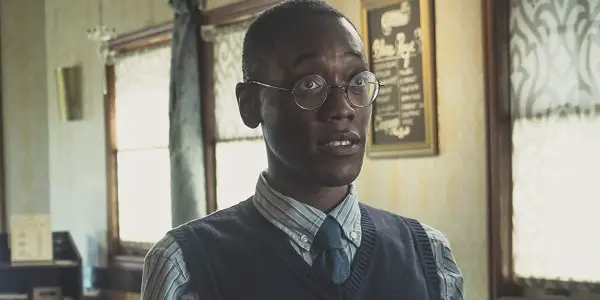TURNOVER: A Digestible Feel-Good Drama

Andrew Stover is a film critic/writer from the Chicagoland. His…
There’s nothing more inspirational than a story about a zealous underdog, or a group of zealous underdogs, who strive to be triumphant despite all the odds stacked against them. Inspirational films are habitually woven into a sports drama (Rocky & Remember the Titans) or raunchy comedy (The Bad News Bears & DodgeBall: A True Underdog Story). But no matter what genre the filmmaker primarily chooses, the outcome of any underdog story will crown the staunch misfit(s) and bring the crowd to their feet — or in the case of Linda Palmer’s Turnover, the patrons to the eatery.
Peter (Paul Guilfoyle) is a recent divorcee who owns a French café with his young and spirited manager named Henry (a charismatic Riker Lynch). Peter oversees a struggling eatery that may be franchised soon. He also has a churlish ex-wife named Fran (Kat Kramer), who recently got herself a new man, and who insistently dictates that any franchise will be managed by her. To relieve some stress, Peter takes two weeks for himself, leaving Henry to take care of the business while he’s gone, to Henry’s dismay. You see, Peter never really listens to Henry, and too much under-appreciation can take a toll on somebody’s patience and obedience to their superior. Henry’s youthful and dynamic; he wants to uphold a vogue business that’ll attract a larger, perhaps younger demographic, and he can’t successfully do that when Peter only wants to run a quaint French café.

With Peter out of town, Henry feasts on anger and frustration, prompting Henry to quit his job at The Crêperie Café, but not before hiring a crew of maladroit misfits — with year-long contracts, I might add — as a final act of revenge. Who are these so-called misfits? Pepper (Isabella Blake Thomas) is the gothic millennial hostess, whose snarky attitude gets quickly tiresome — but what teenager isn’t somewhat exasperating? Miguel (Carlos Carrasco) is the non-English chef who has a few recipes up his sleeve worth adding to the menu, but none of the food Miguel prepares is even remotely French. Gladys (Julia Silverman) is an older and inexperienced waitress with infectious vim. Charlie (Blair Williamson) and Gina (Jamie Brewer) are a couple of lovebirds diagnosed with Down syndrome, and they work together as the busboy and bus girl. And finally, there’s the faint-hearted and lovably dorky William (Adwin Brown), who takes on Henry’s old job as manager.
Turnover boasts a pleasantly diverse cast. The characters bring their own dispositions, backgrounds, and mannerisms to the workplace, so much so that their eccentricities overwhelm Peter. But, as expected, Peter will learn to accept his co-workers for who they are.
An Uplifting Tale Of Friendship
Nowadays, a feel-good movie gets a bad reputation, particularly from film critics and myself, because of cheap sentimentality or inflated joy, but sometimes those synthetic ingredients serve up empty-calorie goodness. And it just so happens that Linda Palmer and Laree Griffith cook up a delectable feel-good drama with Turnover, which brings together an unlikely band of misfits, who unite to save a Southern California French restaurant.
Turnover opens with a step-by-step tutorial on how to make a French turnover. If you do everything right, the buttery pastry puffs up, the filling seethes from within, and you (should) get a warm and flaky turnover. Strangely, the opening sequence is the closest thing we ever get to food porn. For a film about a cafe, sumptuous food is not featured enough. Maybe budgetary restrictions got in the way, but a film about a cafe innately calls for an adequate selection of food, if not a sizable buffet.
Unfortunately, being the abysmal cook I am, I would likely spoil the turnover’s appearance or taste. And that would affront Peter, the owner of The Crêperie Café, who believes that his cafe food should not only look refined and taste delicious, but every menu item should also be French-oriented.
In the beginning, Henry is trying to have a say in the cafe’s future, but Peter won’t listen. When Peter leaves for two weeks, Henry loses patience as Peter’s ex-wife comes in demanding the business to be controlled by her and her son (who is, funnily enough, not yet of age to run a business). Peter comes back from two weeks of stress relief to find Henry has quit his job, and he hired a crew of clumsy and directionless employees to fill his place. At first, Peter doesn’t believe the cafe can make it under these new circumstances, but the oddball employees prove him wrong. Peter learns to embrace new ideas and people, and rewarding friendships come out of Peter’s newfound faculty to adapt to change.

Turnover is an undeniably pleasing drama that follows a group of people that society either disregards or under-appreciates, only to bring them together as a ragtag team of winners. They learn to run a profitable business, but they’re also able to recover their humanity and self-worth, which is far more valuable than money. On the surface, Turnover deploys a cast of zany personalities who would likely colonize a sitcom, but Linda Palmer and Laree Griffith’s script manages to underscore each character with more depth. Even if one of the employees wallows in more introspection than another, at least the script didn’t sideline any of them as a caricature.
Throughout, most of the characters are dealing with their own personal issues. Peter is coping with his divorce from Fran. William lacks confidence as a leader (at one point, he refers to his clipboard where he wrote, “Be stern. Be strong. Be the boss”). Miguel’s taking care of his ailing mother, while Pepper has an unhealthy relationship with her mother (Elina Madison).
The chemistry between Peter and his employees inevitably gets more intimate and animated. When Peter learns more about Pepper’s artistic talent, Miguel’s caretaking duties, and William’s lack of confidence, he pushes his preconceived judgments aside and pursues a real partnership with them. He listens to their ideas and gives them more responsibilities, and in doing so, the business churns a profit, and friendships are created.
Turnover Works With A Diverse Cast Of Characters
Through all the hardship on display in Turnover, the tone is reasonably jaunty, the atmosphere within the little cozy restaurant is fittingly placid, and the characters are not only delightfully kooky, but they’re grounded in reality by their internal and external distress. Miguel’s subplot revolving around his ill mother is one of the film’s emotional highlights, predominantly because of Carlos Carrasco’s skilled performance as the reticent and outwardly flinty Miguel.
Paul Guilfoyle’s fairly convincing performance as Peter nicely captures the character’s prickly and vulnerable attributes. Peter is a divertingly monosyllabic and speciously stern character. Contrary to what others may surmise when they look at him, Peter doesn’t have a stony heart. Peter’s ex, Fran, on the other hand, inherits a frigid heart, as she tends to be more one-dimensional and acidulous. Even more villainous is Fran’s new fiancé, who is a clear-cut bad guy with no redeeming qualities. He’s only there to make Peter jealous, and to make Peter more appealing to Fran. On the upside, Charlie and Gina are an endearing addition to the film, whose peppy spirit and sweet romance warms your heart.

Pepper’s situation with her mother holds narrative weight, but it is only vaguely examined — and when it is the focal point of a scene, it unfolds at the wrong time. Pepper’s mom doesn’t come into focus until the final act. In a misguided scene, Pepper decides the best time to confront her mother is at the hospital, surrounded by other anxious visitors and patients, with one patient actually being one of the beloved protagonists. The scene felt misplaced, and from that point on, Pepper’s mother assumes a bigger role, though her presence feels awfully feigned. Also, a late life-threatening twist slows down the pace, drawing attention to the protracted two-hour runtime.
By and large, Linda Palmer’s Turnover has good intentions. Even so, how the film handles Pepper’s gothic fashion sense is slightly problematic. By the end of the film, Pepper ends up altering her gothic appearance, which would have been fine if it wasn’t treated as a cause for celebration now that she looked “normal”. And, in all honesty, the characters of William and Gladys are sadly underutilized, but that has more to do with the fact that there’s a lot of threads here that need to form a cohesive whole, and not virtually enough time to dwell on every character arc.
That being said, the dire twist that emerges during the final act could have been terminated to make time for the other characters. However, the grave occurrence roughly reinforces the concepts of selflessness and charity, so it’s acceptable in the thematic sense. Despite the occasionally awkward execution, pacing, and acting, Turnover wonderfully underlines real friendship and the perseverance of the human spirit.
In These Uncertain Times, Turnover Is A Feel-Good Drama Worth Consuming
There are a variety of films that closely imitate real-life. Turnover isn’t greatly detached from reality, as it does discuss real-life issues of identity, divorce, and illness, but it is more inviting than it is unpleasant. Linda Palmer’s Turnover is a winning drama of unity, selflessness, and friendship.
Despite showing hints of rot, the laudable diversity of the cast (characters with Down syndrome and hearing impairment are respectfully represented), and the universality of the themes render Turnover a feel-good drama worth devouring in these chaotic times.
Have you seen Turnover? If so, what are your thoughts on it? Let us know in the comments!
Turnover is now available to watch on Amazon Prime Video, or it’s available to rent on any video-on-demand service.
Watch Turnover
Does content like this matter to you?
Become a Member and support film journalism. Unlock access to all of Film Inquiry`s great articles. Join a community of like-minded readers who are passionate about cinema - get access to our private members Network, give back to independent filmmakers, and more.
Andrew Stover is a film critic/writer from the Chicagoland. His film & TV reviews can be found on Film Inquiry & Film Threat.













